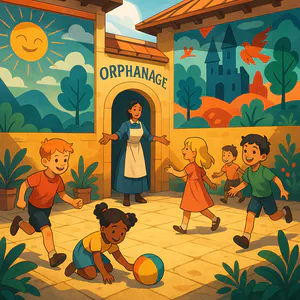Generate orphanage names
More Place Name Generators- <% result.name %>
Discover all Story Shack apps
Discover Heartfelt Names for Your Orphanage
Naming an orphanage is a meaningful task that reflects the love and hope you wish to instill. Use these thought-provoking questions to inspire a name that resonates with the mission and spirit of your establishment.
- What values and virtues do you want the name to embody?
- How can the name reflect the nurturing environment you aim to create?
- What significance does the location hold that could inspire a unique name?
- Are there historic figures or stories that resonate with your mission?
- What emotions do you hope the name evokes in the community and children?
Frequently Asked Questions
Here are some common questions about the Orphanage Name Generator and how it can assist you in finding the perfect name.
How does the Orphanage Name Generator work?
It combines various themes, emotions, and inspirations to generate unique names for your orphanage, providing fresh options with each click.
Can I choose a specific type of name I want?
Unfortunately, you cannot specify types, but feel free to regenerate multiple times until you discover a name that resonates with your vision.
Are the generated names unique?
The names are randomly generated. With unlimited clicks, you'll uncover a diverse selection, though some names may be similar.
How many names can I generate?
You can generate an unlimited number of names; simply click 'Generate' as many times as you desire.
How do I save my favorite names?
You can easily copy a name by clicking on it, or use the heart icon to save it for future reference.
What are good orphanage names?
There's thousands of random orphanage names in this generator. Here are some samples to start:
- Cradles Orphanage
- Boy's Town Orphanage
- New Connections Home
- Comfort Zone Orphan Home
- Daybreak Orphanage
- Guidance Orphan Home
- Cherish Orphan Home
- North Star Orphanage
- Little Bugs Orphanage
- Precious Home Orphan Home
About the creator
All idea generators and writing tools on The Story Shack are carefully crafted by storyteller and developer Martin Hooijmans. During the day I work on tech solutions. In my free hours I love diving into stories, be it reading, writing, gaming, roleplaying, you name it, I probably enjoy it. The Story Shack is my way of giving back to the global storytelling community. It's a huge creative outlet where I love bringing my ideas to life. Thanks for coming by, and if you enjoyed this tool, make sure you check out a few more!






















































